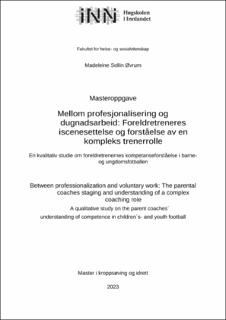Mellom profesjonalisering og dugnadsarbeid: Foreldretreneres iscenesettelse og forståelse av en kompleks trenerrolle
Abstract
Norsk sammendragHensikten med denne studien er å belyse hva slags forståelse foreldretrenerne i barne- og ungdomsfotballen har av kompetanse, og hvordan dette kommer til syne i deres refleksjoner og erfaringer knyttet til deres opptreden og iscenesettelse av trenerrollen.
Det teoretiske rammeverket for denne studien er Goffman sin rolleteori. Flere av Goffman sine begreper benyttes for å forstå hvordan foreldretrenerne iscenesetter trenerrollen, med bakgrunn i deres forståelse av kompetanse. Sentrale begreper er regler og forventninger, opptreden, tro på den rollen man spiller, fasade, dramatisering og idealisering.
Den metodiske fremgangsmåten bygger på kvalitative semi-strukturerte intervjuer med seks foreldretrenere fra ulike fotballklubber. Datamaterialet er analysert i tråd med en refleksiv tematisk analysemetode.
Funnene i studien viser at foreldretrenerne praktiserer sin opptreden utifra en sosial forståelse av kompetanse. Foreldretrenerne vektlegger viktigheten av å skape gode individer, snarere enn resultater. Det å skape et godt og trygt miljø, med fokus på samhold og gode erfaringer utgjør dermed foreldretrenernes opptreden. Fotballen som en sosial arena påpekes også som avgjørende for hvordan deres utøvere opplever fotball, og som videre fungerer som en indikator for foreltrenerne om de lykkes som trenere eller ikke.
Det poengteres at foreldretrenernes tidligere spillerkarriere er en forutsetning for deres opptreden som fotballtrener. Deres tidligere erfaringer bidro til at foreldretrenerne ikke følte et behov for å utvikle deres kompetanse ytterligere, noe som indikerer at foreldretrenerne assosierer deres kompetanse med at de selv har spilt fotball. Videre relatert til en økende profesjonalisering, viser studiens funn at samfunnets forventninger skapte et større press for fotballklubbene. Dette virker imidlertid ikke til å påvirke foreldretrenernes syn på egen kompetanse. Hvordan dette kommer til syne i deres trenerpraksis ugjør et tema for fremtidig forskning.
Nøkkelord: Goffman, kompetanseforståelse, perspektiv på kompetanse, forventninger, foreldretrenere, barne- og ungdomsfotball English abstractThis study addresses how the parental coaches in children's and youth football understand competence, and furthermore how this is shown in their reflections and experiences related to their coaching practice and staging of the coaching role.
The theoretical framework for this study is Goffman´s role theory. Goffman´s terms are used to understand how the parental coaches stage their coaching role, based on their understanding of competence. The central terms are rules and expectations, acting, belief in the role, facade, dramatization and idealisation.
The methodological approach is based on qualitative semi-structured interviews with six parental coaches from different football clubs. The data material has been analyzed in line with a reflexive thematic analysis method.
My findings show that the parental coaches act on the basis of a social understanding of competence. Furthermore, the parental coaches emphasized the importance of fostering good individuals, rather than results. Creating a good and safe environment, with a focus on unity and good experiences is a big part of the parental coaches performance. Football as a social arena is also pointed out as crucial for how their athletes experience football, which further acts as an indicator for the parental coaches to consider whether they are succesful as coaches or not.
It is pointed out that the parental coaches previous playing career is a prerequisite for their performance as football coaches. This underlines the arguments about how the parental coaches associate their competence with their previous football career. Related to increasing professionalisation, the study´s findings show that the expectations from society led to increased pressure on the football clubs. Nevertheless, this does not seem to affect the parental coaches´ view of their own competence. How this manifests in their coaching practice is a topic for future research.
Key words: Goffman, understanding of competence, perspective on competence, expectations, parental coach, children's and youth football
